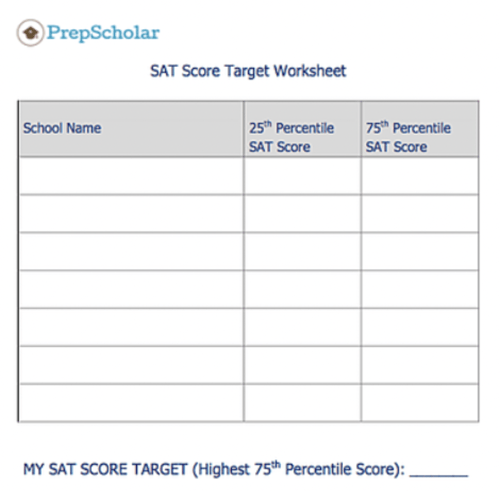
The 2023-2024 college application season is in full swing, which means you’re probably taking standardized tests. Will your scores get you accepted to your top colleges? And if your scores aren’t high enough, what can you do to give your SAT scores an added boost?
We’ll walk you through how to decide if your SAT scores are good enough for your college admissions goals. We’ll:
- Answer the question, “What is a good SAT score for 2024?”
- Explain everything you need to know about overall average SAT scores in 2024
- Show you how to figure out if your SAT score is high enough
Ready? Let’s dive in!

If you want to hit the bullseye with your college application, you need to understand what makes a good SAT score first.
What Is a Good SAT Score for 2024 Overall?
A good SAT score in 2024 is one that gets you accepted to the colleges you’re applying to. That means what qualifies as a “good” score for you will probably be different than what constitutes a good score for someone else. For example, a good SAT score for someone who’s not applying to competitive colleges will be lower than a good score for students who are trying to get into Ivy League schools.
Having said that, we can talk about what makes a “good” SAT score in general by looking at national score averages. A good SAT score will be higher than the national average SAT score.
We’ll start by looking at what’s the average SAT score in 2023. The average cumulative SAT score 2023 was 1023. If we break that down by section, the average Evidence-Based Reading and Writing (ERW) score was 520, and the average Math score was 510.
With that in mind, we can infer that based on past years’ trends, a good SAT score for 2024 will likely be close to a 1023 too.
Now that we know that a good SAT score last year was a 1023 or above, what is a good SAT score for 2024? Typically, any score that puts you in the top 50%, or top half, of SAT takers is viewed as “good.” The higher you score above that average score, the better your score is! On the other hand, scores that are below the national average SAT score will be less competitive on college applications.
Understand How to Use Percentiles to Find Your Good SAT Score (2024)
Now, here’s how you can use the average composite, or total, SAT score to evaluate your own SAT scores. If you scored higher than a 1023, which is the average SAT score, you can consider your score “good.”
If you want to know more about where your scores stand in comparison to other test takers, percentiles can give you even more information. Percentiles tell you what percentage of other test takers you scored the same as or better than.
For example, let’s say you take the SAT test without studying and score in the 30th percentile. That means you scored higher than 30% of other test takers. It also means that you scored under a 1023, which puts your score below average.
But let’s say you study and use PrepScholar’s SAT Complete Online Prep program before your next SAT test. This time, you score in the 75th percentile! You’ve now earned an SAT score that’s higher than 75% of test takers, which is well above average!
To help you get a handle on how to use percentiles to evaluate your score, check out this chart of the 2023 percentile scores for SAT test takers:
|
Percentile |
EBRW |
Math |
Total |
|
99th (Best) |
760 and above |
790 and above |
1530 and above |
|
90th (Excellent) |
670-680 |
690 |
1350 |
|
75th (Good) |
600-610 |
600 |
1200 and above |
|
50th (Average) |
520-530 |
510-520 |
1050 and above |
|
25th (Poor) |
440-450 |
430-440 |
870 |
|
10th (Poorer) |
390-400 |
370-380 |
770 |
|
1st (Poorest) |
330 and below |
310 and below |
670 and below |
Source: The College Board
As you can see from the numbers above, a composite SAT score of 1350 or higher will get you in the 90th percentile, or top 10%, of test takers. In other words, you don’t have to earn a perfect 1600 in order to achieve a great SAT score. Scoring a 1350 will still place you in a higher percentile than most students!
If your composite score is a 770, you’ll fall in the 10th percentile of test takers. Unfortunately, the 10th percentile is considered really low. You’ll only score higher than 10% of test takers with a 770, which won’t enhance your college applications.
But let’s say you increase your score by 100 points to earn an 870 instead of a 770. While 100 points sounds like a lot, that increase in points still only boosts you to the 25th percentile. That means your score will still be below 75% of test takers, which puts you well below average.
Based on the SAT scores for 2023, we can conclude that SAT scores that fall at the 25th percentile or lower aren’t good SAT scores.

Now that the SAT is going digital, does that change what constitutes a good score? Our experts weigh in below.
What’s a Good SAT Score 2024 on the Digital SAT?
Now you know the average SAT score 2023 test takers scored. But what is a good SAT score for 2024, when the exam goes totally digital?
At this point, the College Board says that scoring will work the same on the digital SAT as it did on the paper and pencil SAT. That means that scores on the digital SAT will mean the same thing as scores on the paper exam did. For instance, a 1600 on the digital SAT will be the equivalent of a 1600 on the paper SAT.
You’ll also be able to compare your digital SAT scores to other test takers based on percentile data released by the College Board. For instance, the College Board will still use a percentile range from one to 99 to help students understand how their scores compare to those of other test takers.
At this point, though, we aren’t sure when the College Board will release its first round of data on digital SAT score percentiles. We’ll know later in 2024 how the College Board plans to provide digital SAT score data as a resource to test takers!
At the end of the day, evaluating national percentiles can help you understand how your SAT scores compare to other recent test takers. But since your end goal is to get accepted to your top colleges, you also need to consider how strong your scores are for the schools you’re applying to!
How Do Test Optional Policies Affect What’s a Good SAT Score 2024?
In college admissions, it’s increasingly common for colleges to use either test optional or test blind policies, which mean that test scores are not a required part of your application. But what do these test policies mean for you and your SAT score goals?
At test-optional schools, you can choose whether you submit your SAT scores. Many schools claim that your chances of admission will not be negatively affected if you choose not to submit your scores.
At test blind schools, no applicant’s SAT/ACT scores will be considered during the admissions process. If you submit your scores, they won’t be factored into your admissions decision.
The main way that test optional and test blind policies affect setting your SAT goal score is that they may make it more difficult to find up-to-date SAT score percentiles and averages for some colleges. Many schools that now use test optional or test blind admissions don’t release their admitted students’ SAT scores anymore. This can make it tough to find out what your target SAT score should be.
But there are some aspects of college admissions that test optional and test blind policies don’t apply to. In these cases, if you don’t have test scores available, it could put you in a difficult position.
For instance, some schools may not look at SAT scores when you apply for admission, but they might be required by your departmental program. Test scores may also be used to decide whether students can be exempted from entry-level courses, even at schools that use test optional or test blind admissions. Additionally, some scholarships require test scores as part of their award criteria.
That’s why it’s important to check with your schools before deciding whether to take the SAT! You don’t want to skip the test only to find out that you actually need scores to get into your dream program or qualify for important scholarships.
To learn more about these changes, take a peek at our article on how test optional policies affect the importance of SAT/ACT scores in college admissions. We’ll help you learn how to set SAT score goals if you’re applying to schools that don’t require the SAT.

You’re unique…and so is your target SAT score.
What’s a Good SAT Score 2024 for You?
Seeing how your scores fit match up with national percentiles is a great place to start when it comes to setting and reaching your goals for college and beyond. But to actually get into your dream schools, you need to make sure you’re earning a “good” score for the colleges you’re applying to.
At PrepScholar, we call this process setting your SAT target score. Like an arrow hitting a bullseye, when you hit your target SAT score, you increase your chances of getting admitted!
The first step to setting your target SAT score is confirming the list of schools you’re going to submit applications to. Many schools list the average SAT scores of recently admitted students on their admissions websites. If it isn’t listed there, you can also check a school’s common data set, which you can find online by searching for “[school name] + common data set.”
Once you know the average SAT scores for your schools, you’re ready to set your target score. Your target score will be the same as or higher than the highest average score on your list of colleges. Matching your target score with the highest average score on your score list gives you the best chance of getting accepted to all of your schools!
For example, if the schools you’re applying to have average SAT scores ranging from 1050 to 1230, you’ll want to try and earn a 1230 or higher on your SAT. That ensures you’re meeting or exceeding the average SAT scores for the schools on your list even though your score will be 200 points higher than the 2023 SAT score national average.
From there, you can think about the best ways to increase your score if you’ve taken the SAT but haven’t hit your target score yet. PrepScholar offers expert SAT prep courses and tutoring that can help you earn more competitive scores. We’ll create a study plan that’s customized for you so you can make the biggest score improvement possible!

We’ll walk you through every step you need to take to set your SAT target score. (Jogging shoes optional!)
3 Steps To Setting Your Target Score for 2024
We’ve gone over why you need a target SAT score, so now you’re ready to set a target SAT score that fits with your college goals! Here are three easy steps to setting the right goal score for you.
Step 1: Make a Schools Chart
To begin the process of finding your target SAT score, create a chart that lists the name of every school you’re applying to, along with the 25th percentile and 75th percentile scores for every school’s admitted students. Feel free to create a chart yourself, or you can do it the easy way and download ours. Just click the thumbnail below!

When you make your chart, don’t forget to include all of your match schools and reach schools. There’s no need to include safety schools, since you already know you’re probably overqualified as an applicant to those schools!
To help you get an idea of what your chart will look like, here’s a sample chart with a few schools already listed:
|
School Name |
25th Percentile SAT Score |
75th Percentile SAT Score |
|
University of Texas |
|
|
|
Texas A&M |
|
|
|
Rice University |
|
|
|
Texas Christian University |
|
|
Step 2: Find SAT Score Range for Your Schools
Once you’ve listed your schools in your chart, the next thing to do is track down current SAT score data for the colleges you’re applying to. For this year, that would be the SAT average score 2023. Specifically, you’ll need to look for the average range of SAT scores for each school, or middle 50%.
The middle 50% includes SAT scores ranging from the 25th to 75th percentile scores. You can find this number by going to your college’s official website and searching for data on students’ facts and figures, testing, or admissions. You could also search for “[School Name] average SAT scores” or “[School Name] SAT scores” and look for links that bring you back to your school’s official website.
If you’re still having trouble, search for “[School Name] common data set,” which is an official document that includes admissions data for your college’s most recently admitted class. When you access a college’s common data set, scroll down until you find Section C, which provides data about admitted students’ SAT scores.
When you’ve wrapped up your search, your completed chart will look similar to this:
|
School Name |
25th Percentile SAT Score |
75th Percentile SAT Score |
|
University of Texas |
1240 |
1470 |
|
Texas A&M |
1180 |
1390 |
|
Rice University |
1450 |
1560 |
|
Texas Christian University |
1150 |
1340 |
Step 3: Determine Your SAT Goal Score
Once you’ve filled out your school chart, you’re ready to figure out your target SAT score! You’ll be able to do this by finding the highest 75th percentile score in your score chart. This is the SAT score that you’ll be aiming for when you take the SAT. Why? Because it’s the score that’s most likely to get you accepted to every school on your list!
For example, in our sample chart above, the highest 75th percentile score is a 1560 for Rice. Since that’s the highest 75th percentile score of all your schools, your target score will be a 1560. That’s in the 99th percentile of all test takers!
But what should you do if you’re worried your target score will be tough to reach? You can lower your goal score! A good target score would be a score that’s in between the highest and second-highest 75th percentile scores in your chart. If you use our sample chart, the second-highest 75th percentile score would be a 1470 for UT Austin, which is in the 96th percentile.
When you have your target score set, you’ll need to figure out your goal scores for the Evidence-Based Reading and Writing (ERW) and Math sections too. You’ll do this by dividing your target composite score in half. Doing this will give you approximate scores to aim for on the individual sections of the SAT. For instance, if we use Rice as an example, this would be 1560 2 = 780.

Let’s take a look at how Maria’s goal score set her up for success.
Example: How Maria Set Her Goal Score
To make this process even clearer, let’s look at how a hypothetical student puts it to use. Maria’s filled out her SAT target score chart with all of the schools she’ll be applying to:
|
School |
25th Percentile SAT Score |
75th Percentile SAT Score |
|
University of Nebraska-Lincoln |
1130 |
1360 |
|
University of Arkansas |
1130 |
1280 |
|
Texas Christian University |
1150 |
1340 |
|
Southern Methodist University |
1230 |
1450 |
|
Vanderbilt University |
1450 |
1560 |
Based on these middle 50% scores, Maria should set a target SAT score of 1560. Aiming for the highest average SAT score on her list gives Maria the best chance of getting into all the schools listed on her chart.
But if Maria really wants to get into Vanderbilt, the most competitive school on her list, she may want to aim even higher than a 1560. Why? Because scores above a 1560 will be above average for admitted Vanderbilt students. And, as we’ve talked about, earning an SAT score that’s above average for students admitted to your top school improves your chances of admission!
But what if Maria takes some extra time curating her college list and narrows it down to just three schools? Let’s take a look:
|
School |
25th Percentile SAT Score |
75th Percentile SAT Score |
|
University of Nebraska-Lincoln (UNL) |
1130 |
1360 |
|
University of Arkansas |
1130 |
1280 |
|
Texas Christian University |
1150 |
1340 |
Since the highest average SAT score on this narrowed down list is a 1360 for UNL, Maria should aim for a 1360 on the SAT. But remember: it’s a good rule of thumb to try to score above the highest average SAT score on your list. For Maria, that means aiming for a score above a 1360. This will give Maria the best chance of getting accepted to every school on her list!
When it comes down to it, you’ll need to find out the average SAT scores of recently admitted students to set a target SAT score that can get you into all the schools on your college list. Basing your score goals on the highest average SAT scores of students who got accepted to your target schools is your best chance of getting accepted!
We’ll walk you through this whole process–including how to find the average SAT scores for every school on your list!–in the next section.

You don’t need a TARDIS to know how SAT your score stacks up to scores of the past.
What’s a Good SAT Score 2024 Compared To Past Years?
You now know how to determine what’s a good SAT score for you. But what if you want even more SAT score data to help you set your target scores? One thing you can do is look at SAT scores from past years to determine whether good SAT scores for 2024 stand up to good scores from past years!
The good news is that good SAT scores don’t change much each year. Of course, percentiles and averages can shift up or down a bit from year to year, but they rarely change significantly. In general, what’s considered a good SAT score, based on averages and percentiles, stays steady year after year.
At present, we have data on average SAT scores for students who took the SAT from 2017 to 2023, since the SAT was redesigned in 2016. We can use those successive years of average scores to see how good SAT scores have shifted over the past seven years!
This chart shows average SAT scores from 2017 through the most recent 2023 averages:
|
Year |
Avg EBRW |
Avg Math |
AVG TOTAL |
|
511 |
510 |
1028 |
|
|
529 |
521 |
1050 |
|
|
533 |
528 |
1060 |
|
|
528 |
523 |
1051 |
|
|
531 |
528 |
1059 |
|
|
536 |
531 |
1068 |
|
|
533 |
527 |
1060 |
As you can see from the chart, average SAT scores haven’t changed dramatically over the past seven years. However, external factors can sometimes have an exceptional impact on average SAT scores during some testing cycles. For instance, the COVID-19 (coronavirus) pandemic has had a cascading effect on the average SAT scores for students in 2020, 2021, 2022, and 2023. The pandemic triggered significant changes in students’ learning environments, access to learning tools and exam prep, and general stress. These pressures may have contributed to the average score drop that we see from 2020-2023.
We can also look at percentiles to determine what’s a good SAT score compared to previous years. Percentiles tell you what percentage of test takers you scored the same as or better than on the SAT. You can see current and past SAT percentiles for 2017 through 2023 below:
|
Year |
90th %ile |
75th %ile |
50th %ile |
25th %ile |
10th %ile |
|
1350-1360 |
1200 |
1020-1030 |
870 |
770 |
|
|
1350-1360 |
1200 |
1040 |
890 |
780 |
|
|
1350 |
1200-1210 |
1040-1050 |
890-900 |
780 |
|
|
1340 |
1200-1210 |
1050-1060 |
910 |
800 |
|
|
1340 |
1200-1210 |
1050-1060 |
910 |
800 |
|
|
1340 |
1200-1210 |
1050-1060 |
910-920 |
800 |
|
|
1320-1330 |
1190-1200 |
1050-1060 |
910-920 |
800-810 |
We can see from the chart above that percentiles haven’t changed much over the past seven years. From year to year, score ranges don’t change more than 10 points in each percentile.
Predicting how SAT score averages and percentiles will shift from one year to the next can be difficult. However, since score averages haven’t changed significantly over the past seven years, we can conclude that what counts as a good SAT score hasn’t changed much either.
Conclusion: What Is a Good SAT Score in 2024?
We’ve covered three ways that you can determine what’s considered a good SAT score in 2024.
You can start by looking at the national average composite SAT score. For 2023, that’s a 1028. All scores above that average can be considered good scores, because those scores are higher than the majority of test takers.
You can also look at SAT score percentiles to determine what’s a good SAT score. Percentiles compare your SAT score with those of other test takers by showing you what percentage of test takers scored the same as or higher than you. The higher percentile your scores are in, the better you performed compared to other test takers. 50th percentile scores (1028 or higher) are average, and 75th percentile scores (1200 or higher) and 90th percentile scores (1350 or higher) are good and excellent.
At the end of the day, the best way you can define a good SAT score is by checking the scores of recently admitted students at the colleges you’ll apply to. Find SAT score information for every school on your list, and remember that the 75th percentile score for each school is your target score. That’s the score that’s good for you personally as a college applicant!

What’s Next?
Now that you’ve figured out your goal score, it’s time to start studying. The best place to start is with our ultimate guide to the SAT. It’ll introduce you to the test, give you study tips, and set you up for improving your score.
Once you’ve got the basics down, it’s time to start practicing. One of the best tools in your arsenal are the free SAT practice tests that are available online. These will help you test your skills in real time and adjust your study habits to target your weakest areas.
Of course, you can also get some expert help, too. PrepScholar’s Complete Online SAT Prep program is guaranteed to boost your SAT score. That way, you’ll have a better chance of getting into your dream school.
Source: blog.prepscholar.com
